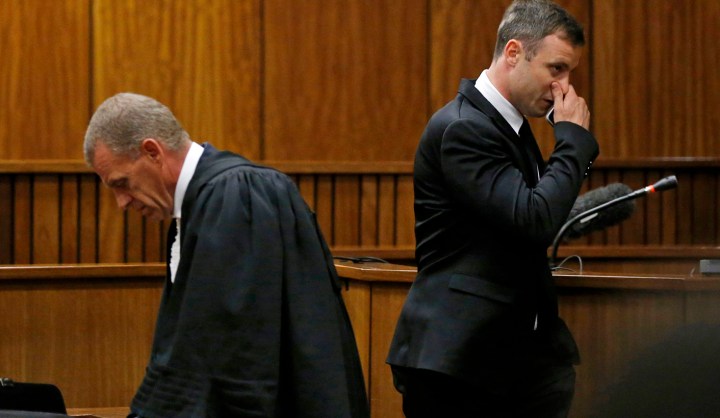South Africa
Oscar Pistorius: The D-Day this way comes

After 18 months, Oscar Pistorius and the family and friends of Reeva Steenkamp are set to find out whether he will go to jail for culpable homicide. In sentencing, the court will weigh a number of factors. But no sentence will fill the void he's created. By GREG NICOLSON.
Oscar Pistorius has always beat the odds. It’s why we knew about him. Born with fibular hemimelia, both legs then amputated below the knee, he became a household name across the world not just because of his achievements, but what he had to overcome. Surmounting hardship: growing up as a regular kid, setting world records as a disabled athlete, winning medals at Paralympic games, competing in the Olympics, and beating a murder charge.
Today, he faces another test as Judge Thokozile Masipa sentences Pistorius in the North Gauteng High Court, the final act in a drama followed across the world for 18 months since he killed Reeva Steenkamp on Valentine’s Day 2013. The court will decide whether to send Pistorius to jail, give him a suspended sentence, a fine, or confine him to house arrest and community service after last month he was charged with culpable homicide and illegally discharging a firearm.
Combined, the seriousness of the offence, society’s interests, his medical needs, level of remorse, contribution to society and lack of criminal history will likely play a part in Masipa’s decision.
While the prosecution failed to get Pistorius convicted of murder largely because its circumstantial evidence and unreliable witnesses could not prove evidence of intent, Prosecutor Gerrie Nel has argued the athlete was highly negligent. He referred to Masipa’s ruling which stated,“He failed to take any step to guard against the resultant death. I am of the view that the accused acted too hastily and used excessive force. In the circumstances it is clear that his conduct was negligent.” A reasonable person, even one with vulnerabilities, would have taken other precautions, but Pistorius, who had time to think, armed himself and went to the toilet without even ascertaining where Steenkamp was.
Defence advocate Barry Roux has argued the degree of negligence and what a reasonable person would do must take into account that the athlete had no intention to break the law and was acting under feelings of vulnerability and anxiety when he believed there was an intruder in the house, a version accepted by the court.
Roux cited multiple case witnesses who said Pistorius was remorseful for what he had done and had already paid a huge price. A trauma counsellor and a social worker both told the court they believed Pistorius’ sorrow and remorse were genuine and the defence also referred to witnesses who testified to Pistorius’ devastation after the killing, his subsequent post-traumatic stress disorder and depression. Arguing Pistorius has already paid a huge price, Roux said the former athlete is broke, has lost his reputation, love and friends.
Nel has cast doubt on whether Pistorius is truly sorry. He says his testimony in court shows he won’t accept responsibility for his actions and the fact that he has lost millions in endorsements since the killing is not a sufficient reason to keep him out of jail.
Roux, however, has argued that there’s another reason not to send the athlete to prison – he can receive better physical and psychological treatment if he is sentenced to correctional supervision, including house arrest. While a prison official last week testified that Pistorius’ rights would be respected in jail and he would have access to necessary treatment, undoubtedly he can get better care outside of prison.
Then there are society’s interests. Last week Steenkamp’s cousin Kim Martins said Pistorius had destroyed their family and they could not accept a sentence that wouldn’t see him going to prison. Nel said the feelings represented all families across South Africa, who if they heard that their daughter was violently shot dead would want to see the perpetrator jailed. Otherwise people will lose faith in the justice system. Roux, however, said the court must impose imprisonment as a last resort and instead it should look to rehabilitative justice. Instead of sending a broken man to prison to be destroyed, Masipa should recognise he can benefit the community, he argued.
The prosecution says society won’t be happy with anything less than 10 years’ imprisonment for Pistorius. The defence says three years of a community-based sentence, with house arrest and community service is punishment enough after the ordeal Pistorius has been through.
Over the weekend, more family members weighed in. Simone Cowburn, Steenkamp’s sister who lives in the UK, told Daily Mail, “Community service and house arrest are ridiculous. These should be for people who are stealing or other minor offences. Not shooting somebody. Reeva deserves justice.” Pistorius’ brother and sister Carl and Aimee meanwhile said they would stand by their brother regardless of the sentence.
Appeals may follow the sentencing depending on whether parties feel the sentence is too lenient or too harsh, or the prosecution wants to challenge Masipa’s application of the law in dismissing the murder charge.
Then there will media analyses of what the Pistorius trial means. It’s been used to debate issues of violence against women, white paranoia and crime in post-Apartheid South Africa, the Afrikaner psyche, male rage in a society so defined by the assertion and denial of masculinity, the inequalities of justice, and gun violence.
Regardless of what happens and the endless conversations that follow, whether Pistorius beats the odds or not, when his hollow point ammunition tore through Reeva Steenkamp his actions left a void that can never be filled. No sentence will repair the damage he has caused. DM
Photo: A file picture dated 16 October 2014 shows South African Paralympic athlete Oscar Pistorius (R) walking past state prosecutor Gerrie Nel (L) on day four of sentencing procedures at the High Court in Pretoria, South Africa. EPA/SIPHIWE SIBEKO/POOL


















 Become an Insider
Become an Insider